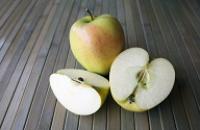
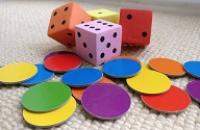
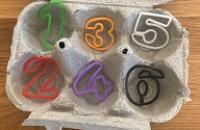
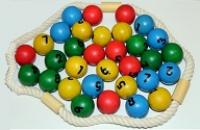
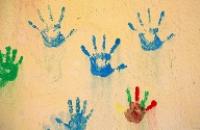
Children often enjoy shopping role play and exchanging coins for selected purchases.
Adults could structure the prices and money allocated to shoppers and model ground rules.
The Activity
Set up the pirate shop where pirates are only allowed ten pounds each and all pieces of treasure cost one pound. Encourage children who are acting as cashiers to check that shoppers buy no more than ten items. You may suggest that customers go back for more items to make up the ten if they don't have 'enough'!
Encouraging mathematical thinking and reasoning:
Describing
How much have you spent so far? How much have you got left?
Reasoning
How many more do you need to buy to have ten?
If you buy those two jewels, how much will you have spent? How much will you have left? How do you know?
Opening Out
If jewels are on offer, 'buy one get one free', how many will you get for five pounds?
Recording
Can you make a shopping list, so that you know how many things to get?
How do you know what you have bought from your list?
The Mathematical Journey
Counting:
- cardinality - the last number gives how many there are altogether
- counting for a purpose - to check the right amount of treasure
Number symbols:
- linking numerals to amounts
Adding and subtracting:
- saying how many you will have if you buy one more thing
- saying how many pounds you will have left if you buy one more thing
- saying how many more you need to have ten things altogether
Dividing and multiplying:
- counting in twos for the 'buy one get one free' offer
Development and Variation
Shops can obviously take a variety of forms, such as a building supplier or garden centre.
Changing prices, so everything costs £2, 10p or 5p, increases the level of challenge.
Games, where the supply of money is controlled by throwing the dice, can also help to structure the activity and focus children on the numbers involved.
Games can also involve real money which has to be checked at the end (e.g. by matching to silhouettes on box lids).
Resources

Plastic pound coins.
Treasure: anything gold, silver or sparkly - necklaces, gold chains, buttons etc.
You can buy brightly coloured 'jewels' from educational suppliers.
Pirate supplies could include food, drink and nautical equipment.
Treasure chests, purses, bags for treasure purchases.
Pirate hats.
Download a PDF of this resource.
Acknowledgement: Georgina Harry and her Reception class at Marlborough Primary School

